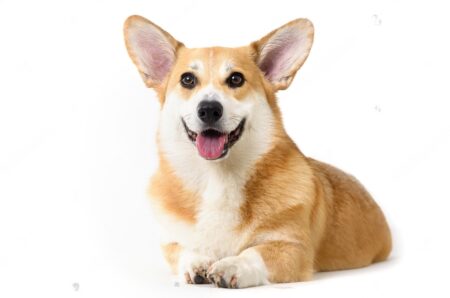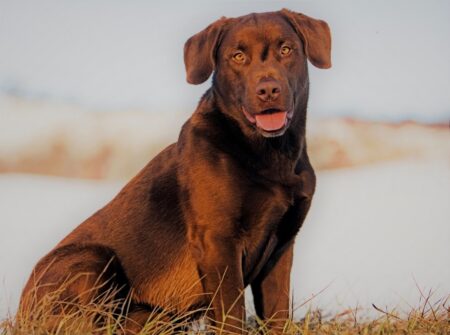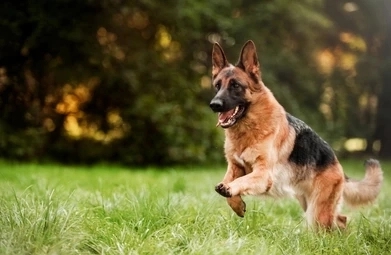Can Dogs Get Hiccups?
Can dogs get hiccups? Absolutely! Just like humans, dogs can get the occasional bout of hiccups. Hiccups in dogs are caused by the same factors that cause hiccups in humans: ingesting large amounts of air, eating too quickly, excitement, stress, and even certain medications. You might see your pup’s chest suddenly jerk and you may even hear a hiccup sound, while they are still trying to figure out what happened themselves.
Can Dogs Get Hiccups?
Yes, dogs can get hiccups just like humans, although it’s typically much less common. Hiccups are the result of an involuntary spasmodic contraction of the diaphragm (the muscle that separates the chest from the abdomen). When this occurs in both humans and dogs, a “hiccup” sound is created. While it may be a little alarming to hear your pup make this noise, hiccups usually aren’t cause for concern. Some possible causes of hiccups in dogs can include eating too quickly, excitement, or a change in air temperature.
Can Puppies Get Hiccups?
Yes, puppies can get hiccups. Hiccups are actually quite common in puppies and can be triggered by eating or drinking too quickly, sudden changes in temperature, excitement, or certain irritants.
Do Hiccups Hurt Dogs?
No, hiccups generally do not hurt dogs. Hiccups can be uncomfortable, however, so your pup may be uncomfortable when hiccuping.
Dog Hiccups And Vomiting
If your dog is experiencing hiccups and vomiting, it is important to get them seen by a veterinarian as soon as possible. This could be a sign of a serious underlying condition, such as gastroenteritis, an intestinal infection, or even bloat. If your pet is also showing signs of lack of appetite or dehydration, it’s important to get them seen right away. Your veterinarian can perform a physical exam, take necessary diagnostics (such as blood work and X-rays), and give your dog the necessary medications or treatments to help them feel better.
8 Week Old Puppy Hiccups
Hiccups in 8 weeks old puppies can occur for a couple of reasons; one being that they may have swallowed air while eating or drinking. It is also common for puppies to hiccup when they become excited or over-stimulated. You can try to prevent hiccups in your puppy by offering small, frequent meals, and if possible reducing over-stimulation. You can also try lightly rubbing your puppy’s back or distracting them for a bit.
How Are Hiccups Similar in Dogs and Humans?
Hiccups in both dogs and humans are spasms of the diaphragm muscle that cause involuntary sudden intake of air followed by the closure of the vocal cords. This causes the characteristic “hiccup” sound. Hiccups may occur in both species for a variety of reasons, such as excessive swallowing (especially of air), eating (or drinking) too quickly, excitement, and for no known reason.
How Are Hiccups Different in Dogs and Humans?
Hiccups are generally considered a normal occurrence in humans and dogs, although the mechanisms that cause them may be different. In humans, hiccups are caused by a spasm of the diaphragm that is associated with a sudden intake of air in response to a certain stimulus. In dogs, hiccups are thought to be caused by a spasm of the respiratory muscles, also in response to a stimulus. Hiccups in dogs and humans will usually end on their own, although humans may need to act out certain remedies to get rid of them.
What Causes Hiccups in Dogs?
Hiccups in dogs can be caused by a variety of things such as eating too quickly, excitement, certain medical conditions, eating something they are not used to, minor digestive issues, and allergies.
Why Do Dogs and Puppies Get Hiccups?
Dogs and puppies get hiccups for the same reason that humans do, which is mainly related to how the diaphragm and other muscles of the respiratory system are functioning. When the diaphragm and other muscles contract involuntarily, a hiccup is the result. This is true regardless of the dog or puppy’s size. Hiccups typically last for a short period of time but can happen several times a day.
There are several causes that can lead to hiccuping in dogs and puppies. Eating too quickly can cause hiccups due to the increased amount of air that the dog or puppy is swallowing when gulping food down. Drinking too quickly can have the same effect. Excitement or anxiety can also cause hiccups, as the dog or puppy’s muscles contract involuntarily in response. Certain medical conditions can also lead to hiccuping in dogs and puppies, including gastroesophageal reflux, respiratory infections, and neurological disorders.
Why Does My Puppy Get Hiccups at Night?
Puppies experience hiccups at night due to their immature digestive systems. Hiccups in puppies usually result from overexcitement or eating too fast prior to sleeping. The hiccups themselves are caused by an abnormality of the diaphragm or breathing muscle. When the diaphragm contracts too quickly, the result is a hiccup. The hiccup itself is usually harmless and passes in a few minutes.
Dog Hiccups Symptoms
The most common symptom of dog hiccups is a repetitive sudden intake of breath that is usually accompanied by a distinctive “hic” sound. It may be accompanied by other sounds such as gasps or squeaks. Some dogs may have visible chest contractions or gulps when they hiccup. The hiccup episodes usually last from a few seconds to a few minutes.
How do I Know If My Dog Has Hiccups?
It is usually easy to tell if your dog has hiccups; they will often make a characteristic sound that is similar to a hiccuping person, with a repetitive and sudden intake of breath. Your dog will usually make this sound while their body is still and its muscles are momentarily contracted. They may also appear to act startled or uncomfortable when their hiccups occur.
Other signs that your dog may be hiccuping include a visible movement in their chest as they take a breath, an audible gasp similar to a hiccup, or even a slight pause in their breathing. You may be able to feel a rhythmic vibration or pulsing movement in their chest when your dog has hiccups. In some cases, you may also observe your dog’s abdominal muscles contract when they have hiccups.
If your dog is exhibiting any of these signs, it is likely that they are hiccuping. If you want to rule out any other conditions or illnesses that may be causing the problem, it is best to visit your veterinarian for a check-up.
What Do Dog Hiccups Look Like?
Dog hiccups look similar to hiccups in humans. Your dog’s stomach muscles may spasm, resulting in a short burst of its diaphragm contracting. Depending on the size of your dog, you may be able to hear or feel your dog’s stomach contracting and the little hiccup-like sound that accompanies it.
SEE ALSO: Easiest Dogs To Train
How To Get Rid of Dog Hiccups
- Distraction: The best way to get rid of dog hiccups is to distract them. This can be done with a toy, such as a ball, stick, or rope. Engaging them in a game or activity can help take their focus off the hiccups and help them relax.
- Feeding: A small snack such as a piece of cheese or a few slices of cucumber can help get rid of a dog’s hiccups. Feeding your pet a small snack can help relax the diaphragm and stop the hiccups.
- Drinking Water: Give your dog some water or even a small cup of tea to help them relax and ease into a hiccup-free state.
- Massage: Gently rubbing your dog’s belly in circular motions can help relax the diaphragm and stop the hiccups.
- Exercise: Playing and running can help get rid of hiccups in a dog. Taking your pet for a walk or playing a game of fetch can help take their mind off the problem.
- Change of Environment: Taking your dog to a different environment such as a scenic park or somewhere there’s a lot of movement and activity can help stop the hiccups.
What If Dog Hiccups Don’t Go Away?
If your dog’s hiccups do not go away for more than a few minutes, it may be best to consult your veterinarian. Hiccups could be a sign of an underlying medical condition and should be evaluated by your vet. Additional tests may be recommended to rule out potential causes such as respiratory infections, airway narrowing, or organ dysfunction.
When Should You Worry About Dog Hiccups?
You should consult a vet if your dog has recurrent hiccups that last for more than an hour or if the hiccups are accompanied by other signs such as loss of appetite or weight, coughing, or difficulty breathing, or if you recognize a change in their behavior such as lethargy or restlessness.
How To Prevent Puppy Hiccups
- Avoid Too Much Exercise: Excessive activity can cause hiccups in puppies, so limit activity just after a meal. Give your puppy some time to rest and digest after eating.
- Monitor Feeding: Avoid overfeeding your puppy, as this can increase the risk of hiccups. If the food is too rich they may be more prone to hiccups after eating. Feed smaller meals more often throughout the day.
- Avoid Excitement: Keep mealtime calm and quiet, and avoid playing with your puppy before and during meals. They may get too excited and cause a case of hiccups.
- Offer Water: Offer a bowl of water following meals, as this can help to keep their stomachs from being overly full.
- Soothe the Puppy: As puppies are more susceptible to hiccups, provide your puppy with some form of comfort, such as gentle petting, to help relax them and decrease the possibility of hiccups.
- White Noise: Playing some white noise in the background can help to provide a soothing atmosphere that can diminish hiccups in puppies.
SEE ALSO: How Many Chromosomes Do Dogs Have?
FAQ
Q. Is it normal for dogs to get hiccups a lot?
A. Yes, it is normal for dogs to get hiccups from time to time. Hiccups in dogs happen the same way as in humans, involuntary spasms of the diaphragm, which causes a “hic” sound.
Q. Do dogs get hiccups when pregnant?
A. No, dogs do not get hiccups when pregnant. Hiccups are caused by an involuntary contraction of the diaphragm and are not related to pregnancy in any way. However, it is possible for dogs to experience nausea, vomiting, and digestive upsets during pregnancy, which may cause them to have episodes of rapid breathing or panting that could be mistaken for hiccups.
Q. Can dog hiccups cause vomiting?
A. No, hiccups in dogs do not generally cause vomiting. Hiccups in dogs usually stem from eating too quickly or excitedly, and these hiccups tend to go away on their own and do not cause any other symptoms.
Conclusion
Yes, dogs can get hiccups just like humans can, and they’re usually a result of overeating or eating too quickly. The good news is that hiccups aren’t dangerous and usually go away on their own. If your dog’s hiccups persist, it’s a good idea to take them to the vet as this may indicate a more serious underlying condition.


